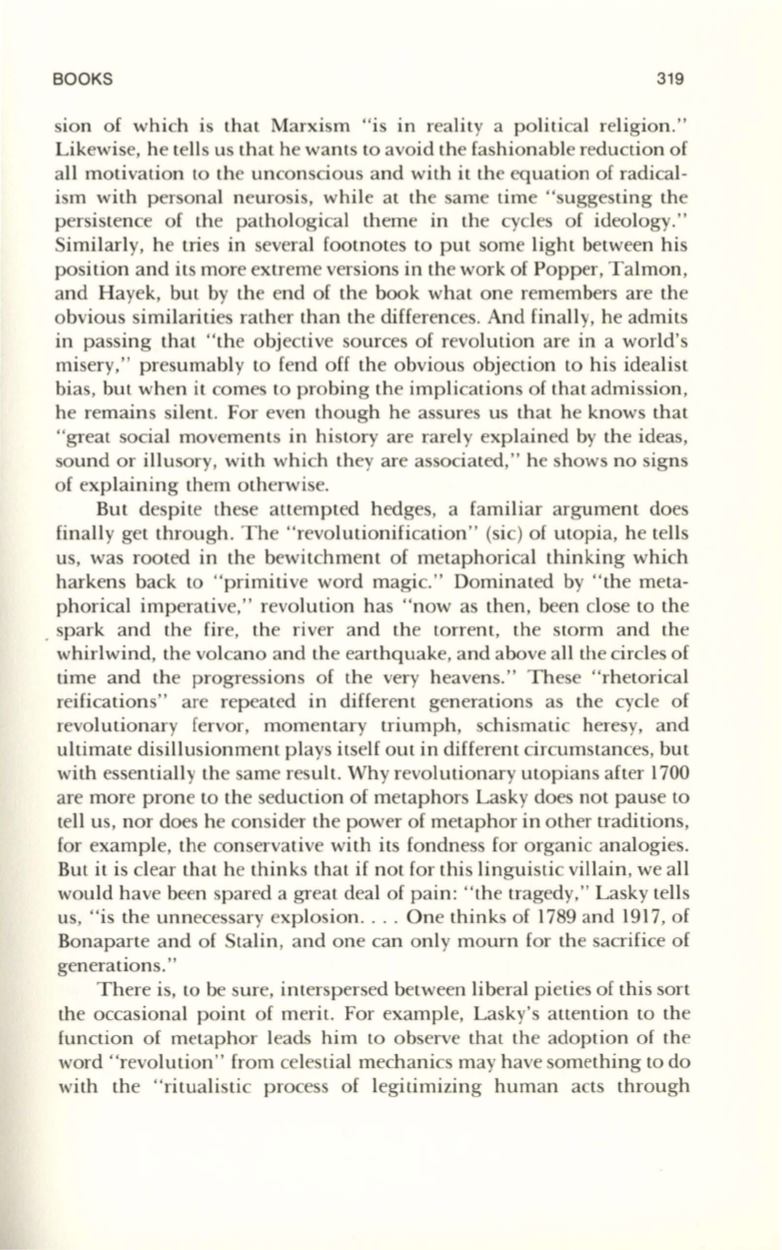
BOOKS
319
sion of which is that Marxism "is in reality a political religion."
Likewise, he tells us that he wants to avoid the fashionable reduction of
all motivation to the uncon cious and with it the equation of radical–
ism with personal neurosis, while at the same time "suggesting the
persistence of the pathological theme in the cycles of ideology."
Similarly, he tries in several footnotes to put some light between his
position and its more extreme versions in the work of Popper, Talmon,
and Hayek, but by the end of the book what one remembers are the
obvious similarities rather than the differences. And finally, he admits
in passing that "the objective sources of revolution are in a world's
misery," presumably to fend off the obvious objection to his idealist
bias, but when it comes to probing the implications of that admission,
he remains silent. For even though he assures us that he knows that
"great social movements in history are rarely explained by the ideas,
sound or illusory, with which they are associated," he shows no signs
of explaining them otherwise.
But despite these attempted hedges, a familiar argument does
finally get through. The "revolutionification" (sic) of utopia, he tells
us, was rooted in the bewitchment of metaphorical thinking which
harkens back to "primitive word magic." Dominated by "the meta–
phorical imperative," revolution has "now as then, been close to the
. spark and the fire, the river and the torrent, the storm and the
whirlwind, the volcano and the earthquake, and above all the circles of
time and the progressions of the very heavens." These "rhetorical
reifications" are repeated in different generations as the cycle of
revolutionary fervor, momentary triumph, schismatic heresy, and
ultimate disillusionment plays itself out in different circumstances, but
with essentially the same result. Why revolutionary utopians after 1700
are more prone to the seduction of metaphors Lasky does not pause to
tell us, nor does he consider the power of metaphor in other traditions,
for example, the conservative with its fondness for organic analogies.
But it is clear that he thinks that if not for this linguistic villain, we all
would have been spared a great deal of pain: "the tragedy, " Lasky tells
us, "is the unnecessary explosion.... One thinks of 1789 and 1917, of
Bonaparte and of Stalin, and one can only mourn for the sacrifice of
generations.' ,
There is,
to
be sure, interspersed between liberal pieties of this sort
the occasional point of merit. For example, Lasky's attention to the
function of metaphor leads him to observe that the adoption of the
word "revolution" from celestial mechanics may have something
to
do
with the " ritualistic process of legitimizing human acts through


